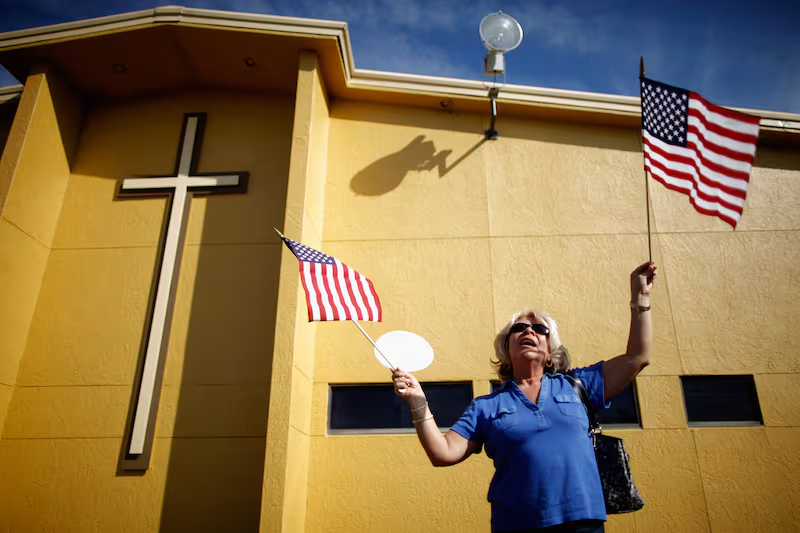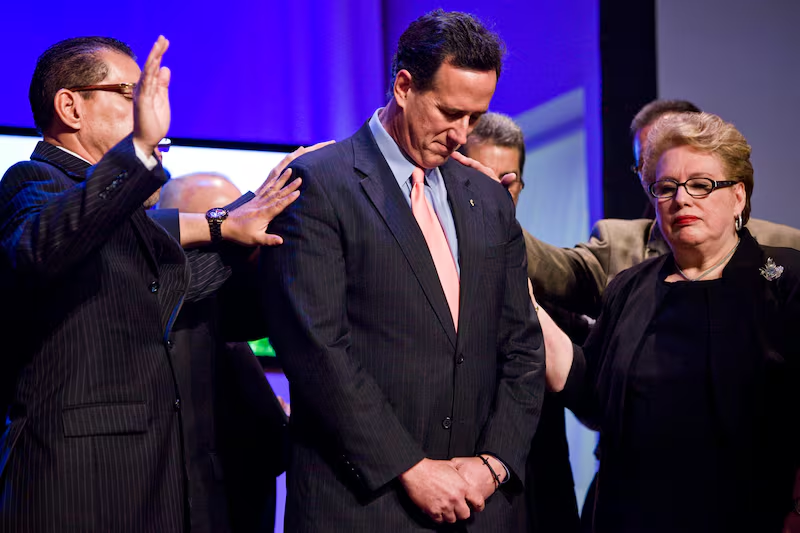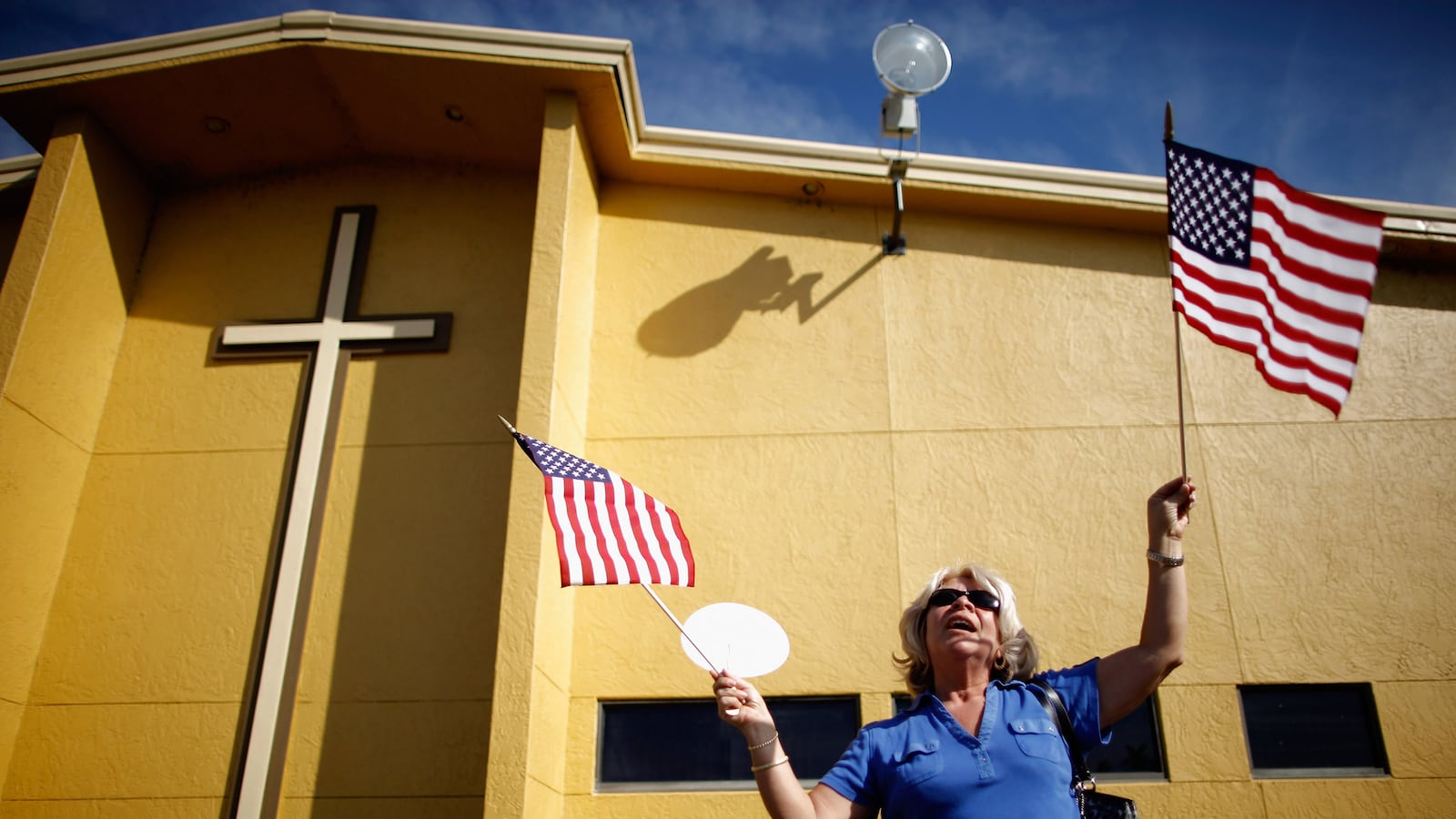Call it the Santorum slot.
In 2012 it was Pennsylvania Sen. Rick Santorum who, despite gaining little traction nationally and struggling to raise money, tapped into Iowa’s evangelical and conservative Catholic community and eked out a slight victory in the state over frontrunner Mitt Romney. Santorum went on to last far longer in the primaries than thought possible for a politician who had been out of office for six years after getting thrashed in a reelection.

In 2008 it was the same with Mike Huckabee, who faced similar problems nationally, but was the favorite of social conservatives of Iowa, won the caucuses there, and battled John McCain through March, long after most other contenders had fallen away.
In 1996 it was Pat Buchanan. Even George W. Bush, although a favorite of the establishment, tapped into the evangelical strain of the Republican Party to launch his presidential run in 2000.
Santorum himself is back in Iowa this weekend, a clear a sign as could exist that he is looking at 2016. But despite Santorum’s strong showing in 2012, few consider him to be in the top tier of presidential contenders.
But none of the other top contenders for the 2016 nod—the Marco Rubios and the Rand Pauls, the Ted Cruzes and the Chris Christies—seem like they will fire up this crowd in quite the same way that Santorum, Huckabee, Bush, and Buchanan did. Sure, they line up where they need to be on God, church, gay marriage, and abortion. But unlike the previous four social conservatives mentioned, they don’t quite hit the right notes, or speak the same language, as the evangelical candidates of old.
The Santorum slot, in other words, is open.
“Everybody can talk a good game, and everybody can understand the words, but at the end of the day, words don’t mean a lot,” said John Brabender, a top adviser to Santorum’s 2012 bid. “It wasn’t Rick Santorum’s rhetoric. It was because he had the core values and the convictions they were looking for. Last cycle everybody tried to speak [the evangelical’s] language, but only a few people could say, ‘Look, you know me, and I am going to do what I have always done.’”
Each of the top contenders of 2016 has made it known in various ways that they are religious minded, too, in addition to keeping a close eye on more earthly concerns like taxes and deficits. Rubio has suggested that the age of the earth is in dispute. Cruz’s father was a traveling preacher, but he recently said that far too many candidates wear their religion on their sleeves. Paul has mostly talked about religious liberty, and Christie has shied away from the issue almost altogether.
Of the above, Rubio is seen as mostly likely to appeal to evangelicals, although a few Republican political operatives interviewed for this article mentioned Louisiana Gov. Bobby Jindal and Ohio Gov. John Kasich as possibilities.
“It may be that none of the candidates have the personal experiences. So while [faith] may be important to them, it is not something they are comfortable talking about,” said Huckabee, who named Rubio as the one who probably comes the closest. “Evangelicals want authenticity, someone who says the same kind of thing regardless of which audience they are speaking to.”
His advice for those approaching evangelical audiences for the first time?
“Say, ‘I respect you guys, but I am not one of you.’ You can’t fake it. It would be like me going to the country club and pretending I speak the language of the golf course, which I don’t. I would be better off saying, ‘I don’t know a golf course from a goat course.’”

That an evangelical candidate has yet to emerge, even though the early stages of campaign season seem to have begun in earnest, have led some operatives on both sides of the aisle to wonder if perhaps the religious wing of the GOP is in abeyance, eclipsed by Tea Partiers and libertarians.
“The party is thinking through its future, and the most vibrant set of thinking isn’t with social conservatives, it is with libertarian populists,” said Rick Wilson, a Florida-based consultant. “All conservatives think that government shouldn’t tell people what to do, but social conservatives think that government should tell people everything about what they can do socially. That bugs a lot of people who think government shouldn’t be involved in people’s personal lives at all.”
Part of the reason for this is that the tent-pole social issues that galvanized evangelicals and conservative Catholics over the last couple of election cycles have largely faded. The momentum behind gay marriage has led evangelicals of even minor political instincts to remain mute on the matter. And on the other hand, conservatives largely feel like they have won the abortion battle, with aggressive restrictions moving in at the state level and public opinion hardening around bans on mid- and late-term procedures.
“They lost a big one, and they won a big one,” says Wilson. “But those two things are sort of done deals.”
If there is still a galvanizing issue, he and others suggested, it is a perception that the Obama administration is moving in on religious freedom by, for example, forcing religious institutions to provide birth-control coverage under the Affordable Care Act. And others suggested that whoever the nominee is would be wise to not turn their back on evangelical matters, since they could represent an inroad to African-American and Hispanic constituencies that are not otherwise inclined to vote Republican.
“If Republicans start abandoning within their platform the marriage issue, the life issue, it is tantamount to surrender,” said Huckabee. “Without the evangelical vote Republican’s can’t win. That is just a fact.”






